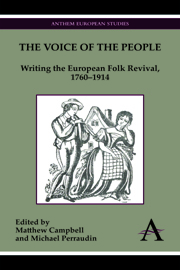Book contents
- Frontmatter
- Table of Contents
- List of Figures
- Introduction
- Chapter 1 The Impact of Ossian: Johann Gottfried Herder's Literary Legacy
- Chapter 2 On Robert Burns: Enlightenment, Mythology and the Folkloric
- Chapter 3 The Classical Form of the Nation: The Convergence of Greek and Folk Forms in Czech and Russian Literature in the 1810s
- Chapter 4 Literary Metamorphoses and the Reframing of Enchantment: The Scottish Song and Folktale Collections of R. H. Cromek, Allan Cunningham and Robert Chambers
- Chapter 5 Thomas Moore, Daniel Maclise and the New Mythology: The Origin of the Harp
- Chapter 6 The Oral Ballad and the Printed Poem in the Portuguese Romantic Movement: The Case of J. M. da Costa e Silva's Isabel ou a Heroina de Aragom
- Chapter 7 Class, Nation and the German Folk Revival: Heinrich Heine, Georg Büchner and Georg Weerth
- Chapter 8 The Estonian National Epic, Kalevipoeg: Its Sources and Inception
- Chapter 9 The Latvian Era of Folk Awakening: From Johann Gottfried Herder's Volkslieder to the Voice of an Emergent Nation
- Chapter 10 From Folklore to Folk Law: William Morris and the Popular Sources of Legal Authority
- Chapter 11 Pioneers, Friends, Rivals: Social Networks and the English Folk-Song Revival, 1889–1904
- Chapter 12 The Bosnian Vila: Folklore and Orientalism in the Fiction of Robert Michel
- Epilogue: The Persistence of Revival
- Bibliography
- Index
- List of Contributors
Chapter 10 - From Folklore to Folk Law: William Morris and the Popular Sources of Legal Authority
Published online by Cambridge University Press: 05 July 2012
- Frontmatter
- Table of Contents
- List of Figures
- Introduction
- Chapter 1 The Impact of Ossian: Johann Gottfried Herder's Literary Legacy
- Chapter 2 On Robert Burns: Enlightenment, Mythology and the Folkloric
- Chapter 3 The Classical Form of the Nation: The Convergence of Greek and Folk Forms in Czech and Russian Literature in the 1810s
- Chapter 4 Literary Metamorphoses and the Reframing of Enchantment: The Scottish Song and Folktale Collections of R. H. Cromek, Allan Cunningham and Robert Chambers
- Chapter 5 Thomas Moore, Daniel Maclise and the New Mythology: The Origin of the Harp
- Chapter 6 The Oral Ballad and the Printed Poem in the Portuguese Romantic Movement: The Case of J. M. da Costa e Silva's Isabel ou a Heroina de Aragom
- Chapter 7 Class, Nation and the German Folk Revival: Heinrich Heine, Georg Büchner and Georg Weerth
- Chapter 8 The Estonian National Epic, Kalevipoeg: Its Sources and Inception
- Chapter 9 The Latvian Era of Folk Awakening: From Johann Gottfried Herder's Volkslieder to the Voice of an Emergent Nation
- Chapter 10 From Folklore to Folk Law: William Morris and the Popular Sources of Legal Authority
- Chapter 11 Pioneers, Friends, Rivals: Social Networks and the English Folk-Song Revival, 1889–1904
- Chapter 12 The Bosnian Vila: Folklore and Orientalism in the Fiction of Robert Michel
- Epilogue: The Persistence of Revival
- Bibliography
- Index
- List of Contributors
Summary
The anarchism of the late nineteenth century was a fluid political philosophy, encompassing diverse and sometimes contradictory solutions to the problem of civilisation. It inspired approaches ranging from the bloody terrorist outrage to neo-Romantic calls to get ‘back to the land’. Matters are further complicated by nomenclature. Those espousing broadly anarchistic ideas were not always comfortable with the label. William Morris represents one example of a socialist who publicly eschewed anarchism, yet held to many of its precepts. Morris believed in individuality and personal growth, but he could not sacrifice his faith in society and the common weal to a virulent rejection of civilisation in the abstract. Importantly, he argued this case without countenancing state socialism as an alternative. Morris was an enemy of legalism, but he believed in duties, manners and responsibilities. He proposed not the rejection of rules, but rather a rejection of rules as administered by institutions. Human nature was essentially good, but its virtues were prone to excess or misdirection; as Morris once explained, ‘Philip sober needs protection against Philip drunk, or he may chance to wake up from his booze in a nice mess’. This colourful image is supplemented by the generous and revealing entreaty, ‘Surely we all of us feel that there is a rascal or two in each of our skins besides the other or two who want to lead manly and honourable lives, and do we not want something to appeal to on behalf of those better selves of ours?’
- Type
- Chapter
- Information
- The Voice of the PeopleWriting the European Folk Revival, 1760–1914, pp. 157 - 170Publisher: Anthem PressPrint publication year: 2012



